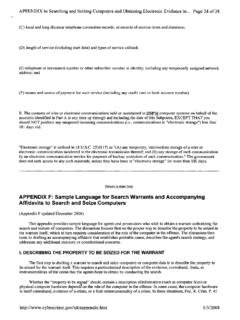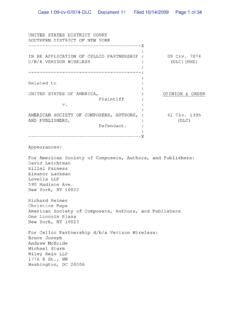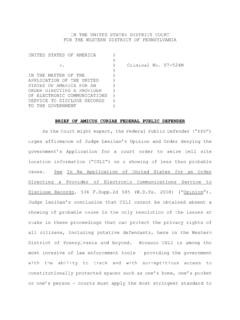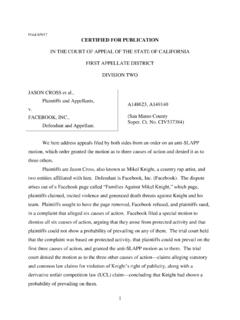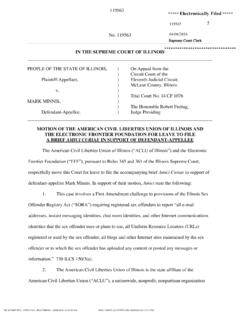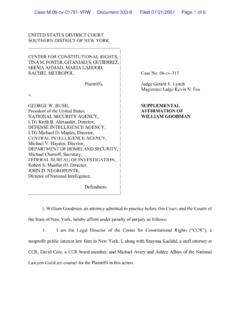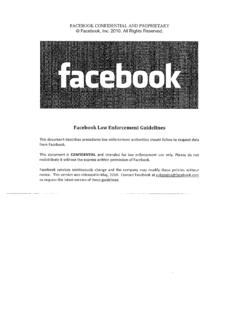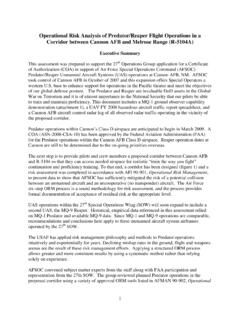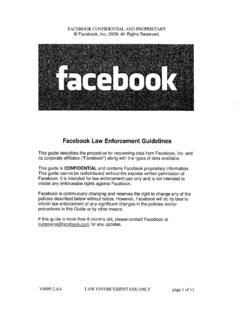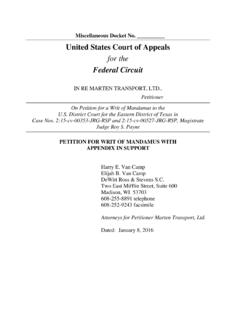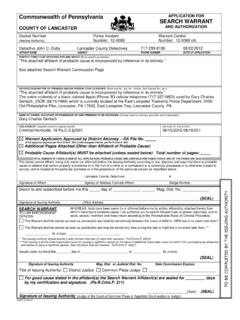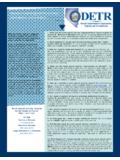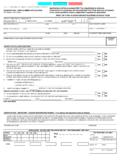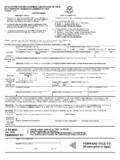Transcription of In re Appeal of Application for Search Warrant
1 IN THE SUPREME COURT OF THE STATE OF VERMONTD ocket No. 2010-479In re Appeal of Application for Search WarrantOriginal Jurisdiction_____Brief Amicus Curiae of the American Civil Liberties Union Foundation of Vermont,the American Civil Liberties Union Foundation, and the Electronic Frontier Foundation_____Jay RortyCriminal Law Reform ProjectACLU Foundation1101 Pacific Ave., Suite 333 Santa Cruz, CA 95060(831) hac vice pendingJason D. WilliamsonCriminal Law Reform ProjectACLU Foundation125 Broad StreetNew York, NY 10004(212) hac vice pendingHanni M. FakhouryElectronic Frontier Foundation454 Shotwell StreetSan Francisco, CA 94110(415) hac vice pendingCatherine CrumpSpeech, Privacy & Technology ProjectACLU Foundation125 Broad StreetNew York, NY 10004(212) hac vice pendingDan BarrettACLU Foundation of Vermont137 Elm StreetMontpelier, VT 05602(802) PRESENTED pageJudicial officers are authorized under the Vermont and United States Constitutions to impose ex ante conditions on the execution of computer Search warrants.
2 4 Based on the facts and circumstances known to the superior court at the time, the ex ante conditions imposed in this case were reasonable and practical ..14iiTABLE OF CONTENTS pageStatement of Issues ..iiTable of Cited Authorities ..ivInterests of Amici Curiae ..viStatement of the Case ..1 Summary of Argument ..3 Argument ..4 I. Searches of Electronic Devices Implicate Heightened Privacy Interests ..4 A. Computers and Smart Phones Contain Large Volumes of Personal Information and Expressive Material ..5 B. Computers are not Closed Containers or File Cabinets ..6 II. The Search Limitations Imposed by the Superior Court are Lawful ..7 A. The Fourth Amendment Forbids Unconstrained Searches ..8 B. Ex Ante Conditions are a Permissible Means of Avoiding Unconstrained Searches ..9 III. The Limitations Placed on the Search Warrant Here are Reasonable and Practical ..14 A. CDT Simply Applies Preexisting Fourth Amendment Law to Computer Searches.
3 15 B. Courts Have Imposed Limits on Electronic Searches Long Before CDT ..17 C. Each of the Conditions Imposed is a Reasonable Measure to Protect Privacy ..20 D. The Conditions Present No Bar to Effective Law Enforcement ..21IV. Conclusion ..24 Certificate of Compliance ..25iiiTABLE OF CITED AUTHORITIESC asesAlbitez v. Beto, 465 954 (5th Cir. 1972)..13 Andresen v. Maryland, 427 463 (1976)..18 Coolidge v. New Hampshire, 403 443 (1971)..8 Davis v. Gracey, 111 1472 (10th Cir. 1997)..9 DeMassa v. Nunez, 747 1283 (9th Cir. 1984)..11 Deukmejian v. Superior Court, 162 Cal. Rptr. 857, 103 253 (1980)..11 Groh v. Ramirez, 540 551, (2004)..13In re Cunnius, No. 2:11 mj 00055-JPD-JLR, 2011 WL 991405 ( Wash. Feb. 11, 2011)..7In re Grand Jury Subpoena Duces Tecum Dated Nov. 15, 1993, 846 11 ( 1994)..22In re Search of 3817 W. West End, 321 F. Supp. 2d 953 ( Ill. 2004)..18, 19, 22 Marcus v. Search Warrants, 367 717 (1961)..6 Marron v.
4 United States, 275 192 (1927)..9 Maryland v. Garrison, 480 79 (1987)..9 Maryland v. Macon, 472 463 (1985)..6 McDonald v. United States, 335 451 (1948)..8 New York v. Video, Inc., 475 868 (1986)..5 People v. Carratu, 755 800 ( Sup. Ct. 2003)..19 Reno v. ACLU, 521 844 (1997)..6 Richards v. Wisconsin, 520 385 (1997)..13 Roaden v. Kentucky, 413 496 (1973)..6 Stanford v. Texas, 379 476 (1965)..8, 14 United States v. Abrams, 615 541 (1st Cir. 1980)..16 United States v. Banks, 540 31 (2003)..14 United States v. Barbuto, No. 2:00CR197K, 2001 WL 670930 (D. Utah. April 12, 2001)..18, 19 United States v. Campos, 221 1143 (10th Cir. 2000)..18 United States v. Carey, 172 1268 (10th Cir. 1999)..passimUnited States v. Clark, 638 89 (2d Cir. 2011)..9 United States v. Comprehensive Drug Testing, Inc., 621 (9th Cir. 2010)..passimUnited States v. D Amico, 734 F. Supp. 2d 321 ( 2010)..9 United States v. Farlow, No. CR-09-38-B-W, 2009 WL States v. Gourde, 440 1065 (9th Cir.)
5 2006)..5, 7 United States v. Hunter, 13 F. Supp. 2d 574 (D. Vt. 1998)..19, 22 United States v. Kow, 58 423 (9th Cir. 1995)..9 United States v. Mann, 592 779 (7th Cir. 2010)..19 United States v. Spilotro, 800 959 (9th Cir. 1986)..19 United States v. Tamura, 694 591 (9th Cir. 1982)..16 United States v. District Court (Keith), 407 297 (1972)..6 United States v. Wasler, 275 981 (10th Cir. 2001)..18 Warden, Md. Penitentiary v. Hayden, 387 294 (1967)..8 Williams v. Broaddus, 331 F. App x 560 (10th Cir. 2009)..11 Zurcher v. Stanford Daily, 436 547 (1978)..6ivOther AuthoritiesAdam M. Gershowitz, The iPhone Meets the Fourth Amendment, 56 L. Rev. 27 (2008)..4 Nick Bilton, Tracking File Found In iPhones, Times, Apr. 20, Kerr, Ex ante Regulation of Computer Search and Seizure, 96 Va. L. Rev 1241 (2010)..14 Orin S. Kerr, Searches and Seizures in a Digital World, 119 Harv. L. Rev. 531 (2005)..5 Paul Ohm, Massive Hard Drives, General Warrants and the Power of Magistrate Judges, 97 Va.
6 L. Rev. In Brief 1 (2011)..14, 15 Raphael Winick, Searches and Seizures of Computers and Computer Data, 8 Harv. & Tech. 75 (1994)..18 Susan W. Brenner, Law in an Era of Pervasive Technology, 15 Widener 667 (2006)..5 United States Department of Justice, United States Attorney s Manual , 1999 WL R. Crim. P. 41(e)(2)(A)(ii)..11Vt. R. Crim. P. 41(c)(5)(ii).. Const. amend. OF AMICUS CURIAE1 The American Civil Liberties Union Foundation of Vermont ( ACLU-VT ) is a statewide, nonprofit, nonpartisan organization with more than 3,000 members and supporters dedicated to the principles of liberty and equality embodied in the constitutions and laws of Vermont and the United States. The American Civil Liberties Union Foundation ( ACLU ) is a nationwide nonprofit, nonpartisan organization with over 550,000 members, dedicated to the defense and promotion of the guarantees of individual rights and liberties embodied in the state and federal constitutions. The Electronic Frontier Foundation ( EFF ) is a non-profit, member supported civil liberties organization based in San Francisco, California, working to protect free speech and privacy rights in the online world.
7 As part of that mission, EFF has served as counsel or amicus in key cases addressing computer crime, electronic privacy statutes and the Fourth Amendment as applied to the Internet and other new technologies, including United States v. Maynard, 615 544 ( Cir. 2010). With more than 14,000 dues-paying members, EFF represents the interests of technology users in both court cases and in broader policy debates surrounding the Application of law in the digital age, and publishes a comprehensive archive of digital civil liberties information at party or counsel for a party authored this brief in whole or in part, and no party or counsel for a party made a monetary contribution intended to fund the preparation or submission of this brief. No person other than Amici Curiae, its members, or its counsel made a monetary contribution to its preparation or submission. viSTATEMENT OF THE CASEIn December 2010, the Burlington police began investigating an allegation that a resident of that city had committed identity theft in contravention of Vt.
8 Stat. Ann. tit. 13, 2030, by applying online for a credit card using the personal details of an elderly upstate New York man. A combination of Internet service provider billing details, motor vehicle records, a witness interview, and the credit card Application information which contained an email address appearing to be the lone suspect s real name quickly narrowed the scope of the investigation to a Pleasant Street residence where the man resided, and the computer with which he allegedly applied for the credit thereafter, the detective applied to the superior court for a Search Warrant pursuant to Vt. R. Crim. P. 41. The Warrant Application set forth an account of the investigation and appended boilerplate allegations regarding the use of computers to commit certain crimes. Without any tailoring to include facts specific to the Pleasant Street investigation, the form language pasted into the Warrant Application asked to seize [a]ny computers or electronic media, including hard disks.
9 Compact disks .. cell phones or mobile devices .. and removable storage devices such as thumb drives [or] flash drives in the house, Warrant App. Attachment A 2, because, in the template s recitation, if a computer or electronic medium is found on the premises, there is probable cause to believe that [evidence of the alleged crime] will be stored in that computer or electronic medium. Warrant App. 6. The form also stated that although it is possible that the PREMISES will contain computers that are predominantly .. owned[] by persons who are not suspected of a crime, those computers should be seized and searched [b]ecause electronic data can easily be moved between different computers. Id. 8. The Application proposed that the superior court grant permission for the police to conduct an off-site Search of the seized devices, to take as long as necessary, id. 11, using whatever data 1analysis techniques appear necessary, including having the police peruse every file briefly.
10 Id. the same day, the superior court granted the Application in part, following the example provided by United States v. Comprehensive Drug Testing, Inc., 621 (9th Cir. 2010). Specifically, the court s Order required:1)The exclusion of the plain view doctrine, such that the government may not rely on said doctrine to seize, copy, or otherwise utilize evidence related to criminal matters other than the identity theft offenses;2)The restriction of the inspection and investigation of the computer to an independent third party or personnel who are not involved in the investigation;3)The segregation and redaction of relevant evidence from other information;4)The nondisclosure of information outside the scope of the Warrant to State investigators or prosecutors;5)The use of techniques that focus on the specific criminal activity under investigation, including time periods, key word searches, and searches of limited file types;6)The prohibition of government tools that are used to specifically identify well-known illegal files that are not at issue in this case.
